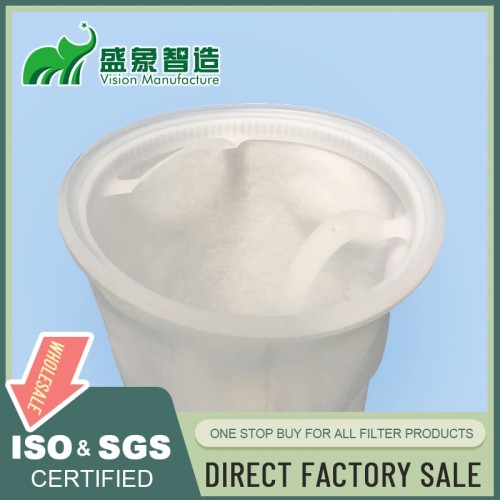
400 Micron Filter Bags Enhance Coarse Particle Removal
I. Introduction
In industrial settings, effective coarse filtration is crucial for protecting equipment and ensuring process integrity. This introduction explores the importance of 400 micron filter bags, which are instrumental in pre-filtration and various specific applications, enhancing overall system efficiency.
II. Understanding 400 Micron Filtration
400 micron filtration serves as a critical step in removing larger particulate matter from fluids:
- Defining the 400 Micron Rating: Explains the capability of these filters to capture particles of 400 micrometers in diameter.
- Particle Size Context: Discusses the types of particles typically targeted by this level of filtration.
- Filtration Efficiency at This Level: Evaluates the effectiveness of 400 micron bags in maintaining clean operational environments.
III. Types of 400 Micron Filter Bags
These filter bags come in various materials and constructions to suit different industrial needs:
- Material Options: Includes polypropylene, polyester, and nylon, each offering unique benefits.
- Construction Methods: Features sewn, welded, and mesh options to enhance durability and performance.
- Size and Shape Variations: Available in multiple configurations to fit a wide range of systems.
IV. Industrial Applications
400 micron filter bags are essential across multiple sectors:
- Water Treatment and Management: Crucial for removing large debris and protecting downstream processes.
- Chemical Processing: Filters out particulates that could compromise chemical reactions.
- Food and Beverage Production: Ensures the removal of coarse impurities to maintain product quality.
- Oil and Gas Industry: Protects equipment by pre-filtering particulates in extraction and processing.
- Paint and Coatings Manufacturing: Captures aggregates and particulates to ensure smooth finishes.
- Agricultural Irrigation Systems: Prevents clogging and protects irrigation equipment.
V. Material Choices
Selecting the right material is crucial for optimal performance:
- Polypropylene: Known for its chemical resistance and suitability for a wide range of applications.
- Polyester: Offers excellent strength and durability under high-flow conditions.
- Nylon: Renowned for its abrasion resistance and flexibility.
- Specialty Materials: For specific needs, such as high-temperature or chemically aggressive environments.
VI. Design Features
The design of 400 micron bags is critical for their performance:
- Bag Dimensions and Capacities: Tailored to meet the requirements of various filtration systems.
- Seam Types and Their Importance: Affects the overall strength and integrity of the bags.
- Retention Mechanisms: Ensures that particles are effectively captured without bypass.
- Flow Optimization Designs: Maximizes the efficiency of fluid dynamics within the filter.
VII. Performance Characteristics
Performance metrics for 400 micron bags include:
- Flow Rates and Capacity: The volume of fluid that can be processed efficiently.
- Dirt-Holding Ability: The amount of particulate matter the bags can retain.
- Chemical and Temperature Resistance: Suitability for operating under various environmental conditions.
- Durability and Lifespan: Longevity of the bags under typical operating conditions.
VIII. Selection Criteria
Choosing the right 400 micron bag involves:
- Process Requirements Assessment: Understanding the specific needs of the filtration system.
- Compatibility Considerations: Ensuring the materials are suitable for the fluids being processed.
- Cost-effectiveness Analysis: Balancing initial costs with operational benefits.
- Regulatory Compliance Factors: Meeting industry-specific filtration standards.
IX. Installation Tips
Proper installation is crucial for maximizing filter performance:
- Proper Handling and Insertion Techniques: Ensures the integrity of the bags during setup.
- Ensuring Correct Seating and Sealing: Prevents bypass and ensures optimal filtration.
- System Preparation and Startup Procedures: Readies the system for efficient operation.
- Common Installation Pitfalls to Avoid: Helps prevent common errors that can affect filtration efficiency.
X. Maintenance and Cleaning
Effective maintenance extends the life and functionality of 400 micron bags:
- Monitoring and Inspection Routines: Regular checks to ensure optimal performance.
- Cleaning Methods and Frequency: Recommendations for cleaning to extend the bag's life and maintain efficiency.
- Replacement Indicators and Timing: Knowing when to replace bags to maintain system integrity.
- Troubleshooting Common Issues: Addressing typical problems to minimize downtime.
XI. Comparative Analysis
Understanding when to use 400 micron filtration versus other ratings involves:
- 400 Micron vs. Finer Filtration Grades: Comparing its effectiveness against finer options like 200 microns.
- Advantages Over Coarser Screens: Assessing the benefits of more precise particle removal compared to larger micron ratings.
- Cost-benefit Analysis in Various Applications: Evaluating the economic impacts of using 400 micron bags versus other filtration methods.
XII. Success Stories
Case studies from various industries demonstrate the effectiveness of 400 micron bags in enhancing filtration processes, solving specific challenges, and delivering quantifiable improvements.
XIII. Future Trends
Emerging technologies and trends in the field of coarse filtration include:
- Advanced Materials in Filter Media: Enhancements that improve durability and filtration efficiency.
- Smart Monitoring and Self-Cleaning Systems: Incorporation of sensors and automated cleaning to enhance maintenance.
- Sustainable Materials and Practices: Developing environmentally friendly materials that offer similar benefits.
- Integration with Overall Process Optimization: Tailoring solutions to meet specific industrial needs.
XIV. Conclusion
400 micron filter bags are essential for optimizing industrial filtration processes, offering a balance of efficiency and cost-effectiveness. As industries continue to demand higher standards in filtration, these bags provide a reliable and effective solution. For organizations looking to enhance their filtration systems, embracing these advanced solutions is a strategic move towards achieving superior operational outcomes.
Leave a comment

